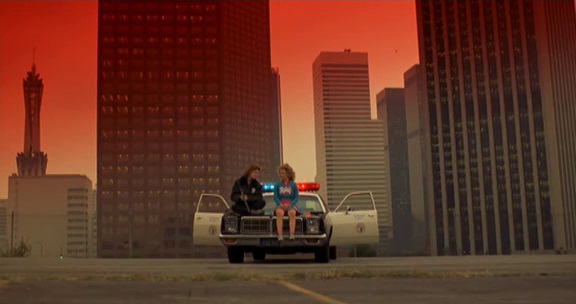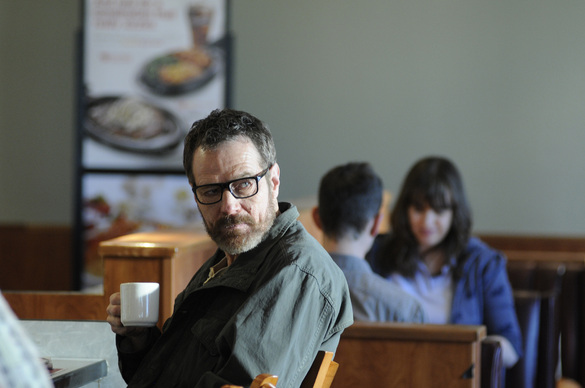
EDIT 2/24/2012: I previously commented on how the term “savior” applied to the character Emma and mistakenly wrote that it had not been used before. It had indeed been used in past episodes to describe her. This was an oversight, and I apologize.
Once Upon A Time, Season 1, Episode 19: “The Return”
Written by Jane Espenson
Directed by Paul Edwards
Airs Sundays at 8pm (ET) on ABC
Rumplestiltskin scenes are almost guaranteed to be intriguing and well acted. So, whole episodes devoted to this character usually stand out as solid entries in the show’s canon. For the most part, “The Return” meets expectation, but ultimately ends on a weak note after an episode’s worth of intricate material.
 The episode uses a flashback to open in the “real world” with the mysterious August Booth twitching on a bed, possibly having a seizure. It’s still unclear. He quickly calls an unknown person and insists on moving forward with a plan that leads him to Storybrook. That’s all we get of his background before it cuts to the present. We then see how he recruits Henry to help him sneak around Gold’s pawnshop so he can find what he’s looking for (at the time, also unclear). Gold catches August and then spends the rest of the episode trying to uncover his true identity. What he does find leads to several plot twists that make this episode’s path hard to predict.
The episode uses a flashback to open in the “real world” with the mysterious August Booth twitching on a bed, possibly having a seizure. It’s still unclear. He quickly calls an unknown person and insists on moving forward with a plan that leads him to Storybrook. That’s all we get of his background before it cuts to the present. We then see how he recruits Henry to help him sneak around Gold’s pawnshop so he can find what he’s looking for (at the time, also unclear). Gold catches August and then spends the rest of the episode trying to uncover his true identity. What he does find leads to several plot twists that make this episode’s path hard to predict.
The rest of Storybrook is still buzzing with Kathryn’s reappearance. David attempts to reconcile his mistakes with her and the now-innocent Mary Margaret. He’s only half successful as Mary Margaret refuses to continue seeing him. Emma finds Sydney to confront him about the bug he planted in her office. He’s rife with guilt by covering up for Regina, but warns Emma to refrain from accusing her for Kathryn’s disappearance no matter how much the evidence leads to her.
In the Enchanted Forest, we see more of Rumplestiltskin and his relationship with his son, Baelfire. Everyone fears the boy because of his unpredictably dangerous father. Baelfire, sick of how his father has changed, seeks help from the Blue Fairy to change Rumplestiltskin back to normal. Rumplestiltskin agrees to give up his power if Bael can find a way for him to relinquish it without harming himself or another, but when Bael acts on a possible opportunity, Rumplestiltskin fails to uphold his end of the deal. In the time to act, he chooses the power over his son.
 “The Return” is jammed full of story, covering a lot of ground in a methodical pace that hurries the plot forward without rushing it. This results in many guest performances as the story jumps around from one protagonist to the next. We spend brief moments with Kathryn, Dr. Hopper, Mother Superior (aka the Blue Fairy), Sydney and the all the series regulars. Storybrook feels like a true community in these moments rather than just a setting as it’s often taken for granted.
“The Return” is jammed full of story, covering a lot of ground in a methodical pace that hurries the plot forward without rushing it. This results in many guest performances as the story jumps around from one protagonist to the next. We spend brief moments with Kathryn, Dr. Hopper, Mother Superior (aka the Blue Fairy), Sydney and the all the series regulars. Storybrook feels like a true community in these moments rather than just a setting as it’s often taken for granted.
The Enchanted Forest scenes utilize a slower pace to concentrate on Bael’s struggle with his father. Dylan Schmid returns as Bael and unfortunately shares most of his scenes with the show’s finest actor Robert Carlyle. Schmid hits the right beats with his performance, but he’s not the most believable character. It’s hard not to “feel” him acting through the dialogue. However, he pulls it together for the show’s climactic scene and really sells his disappointment in his father when Rumplestiltskin is too much of a coward to follow his son across space and time. Both he and Carlyle make this one of the best moments of the episode. Interestingly enough, this happens relatively early in the episode, leaving room for a few more plot twists as we continue to follow the events in Storybrook.
Another near climactic moment occurs between Gold and August. It’s supposed to be a sincere and heartfelt scene between these two characters, but feels very hokey. At the time, it just feels like poor writing, but we then learn something about August that validates the cheap feel of the previous scene. Writer Jane Espenson makes an interesting choice in playing with audience expectation, venturing into what feels like self-parody upon retrospection. Any viewer who realizes this could easily feel duped into going along with not only a character’s deceit but for easily investing into the rushed sentimentality that precedes it. It’s a nice reminder that the writers are indeed in control and still ahead of the audience.
 After such an elaborate mystery with Mr. Gold and August, the show settles for a lackluster finish. It leaves us with Emma and Regina rehashing much of their dynamic that we’ve seen before. As noted before in these reviews, Regina always has the upper hand and Emma repeatedly falls for her traps. It’s obviously frustrating and takes away the credibility of the main character. This time, Emma doesn’t fall into a trap so much as she hits a dead end. From the way it’s set up, it seems like Regina will find her way out of accusation regarding Kathryn’s kidnapping. The last scene painfully takes us step by step as to how she plans on doing that. It’s not necessary or interesting, and it should have played earlier in the episode, leaving the last scene to be between Gold and August.
After such an elaborate mystery with Mr. Gold and August, the show settles for a lackluster finish. It leaves us with Emma and Regina rehashing much of their dynamic that we’ve seen before. As noted before in these reviews, Regina always has the upper hand and Emma repeatedly falls for her traps. It’s obviously frustrating and takes away the credibility of the main character. This time, Emma doesn’t fall into a trap so much as she hits a dead end. From the way it’s set up, it seems like Regina will find her way out of accusation regarding Kathryn’s kidnapping. The last scene painfully takes us step by step as to how she plans on doing that. It’s not necessary or interesting, and it should have played earlier in the episode, leaving the last scene to be between Gold and August.
How did you find these last moments? Did they pique your interest or make you yawn? Leave your comments in the section below.
Ryan Clagg





